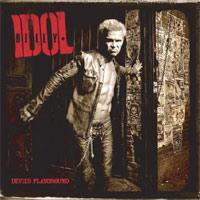Billy Idol. While there isn't much need for an introduction here, it should be iterated that Devil's Playground is his first proper full-length since 1993's ill-received Cyberpunk, Idol's critically panned foray into fields of electronic pop-rock and dialog samples. So while Idol has definitely reeled in his attempts at far-reaching creativity in the twelve years between (which also includes a re-released version of his sophomore effort Rebel Yell, an "essentials" compilation and a Vh1 Storytellers disc), there's still a few missteps on Devil's Playground that show Idol hasn't completely rediscovered his niche.
The first few songs on the disc are solid and catchy punk-infused rock'n'roll songs that fans of Stiff Little Fingers and latter-era Social Distortion may or may not get some kicks out of due to the the poppy nature. Idol, or his production team at least, has obviously rounded up a competent set of musicians to help back him up. "Scream" is a throwback to his fist-clenched 80's days and the opener "Super Overdrive" shows that Idol can be pretty versatile with his voice when he wants to be. The acoustic-tinged verses and aggressive nature of their following cynical chorus of "Rat Race" makes for a standout, too.
However, Idol starts to slip as the disc reaches its midsection with genre-hopping that just doesn't seem fit for him. The bells-led, holiday-themed "Yellin' At the X-Mas Tree" is a ridiculously untimely, eventually wonderfully-marketable yet silly gaffe of an album track describing a father's Christmastime drunken rage; the song is far better suited as a hidden bonus feature or the like. The laid-back folk-trucker romp of "Lady Do Or Die" seems a bit out of place even if taken as more literal Ness influence. "Evil Eye" contains a chorus and bridge representing the outfit's take on early 90's aggress-grunge that sounds like it was ripped straight from Velvet Revolver's Contraband, complete with inane pop radio club-beat production echo effects usually reserved for bland major label pop-rock acts. The tracks that make up the rest of â¦Playground are either bad attempts at mainstreaming or halfway-met ballads that'll leave you wondering if and when the album will ever finish.
In his defense, Idol's voice seems stronger than ever all through the disc. His range is astounding considering the wear and tear it's been through; subtle melody stays intact while he retains an abrasiveness even against the very crystal clear production. Granted it might just be the result of loaded clean up work, but he sounds great nonetheless.
Lyrically, Idol isn't necessarily treading the same ground he's walked on, but it isn't drastically different either. He answers doubts about his comeback in a third-person narrative in "Super Overdrive," calls for a homebound return of a barroom gal in one of the disc's sunnier tracks, "Sherri," and lets sins roll ballad-style to a dashboard "Plastic Jesus."
What we're left with is a comeback album about halfway full of fairly inspired, catchy rock songs, and another half with questionable "experimenting." You can't fault Idol for wanting to explore, but it just doesn't fit him. Devil's Playground definitely has the potential to put out a few hits, but it's likely that regardless of the selection, they won't quite be fully representative of the album.
